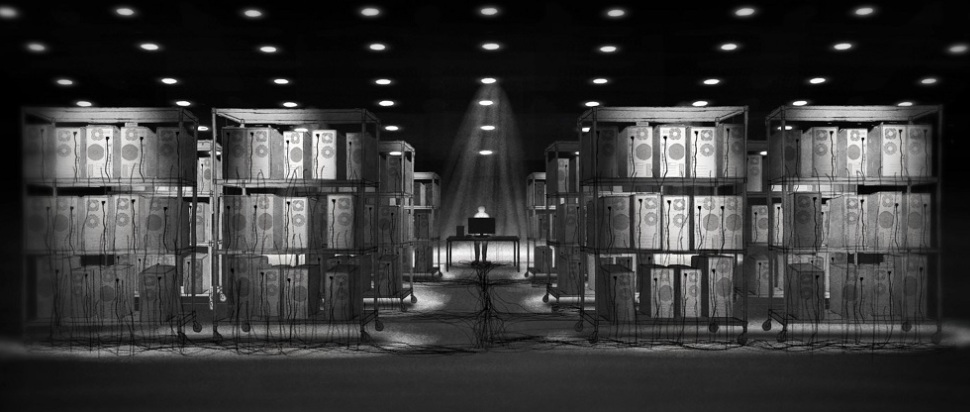Absolute Denial: Ryan Braund on his indie animation
Sheffield-based filmmaker Ryan Braund presents his first feature film, Absolute Denial, at Edinburgh Film Festival this month. The director talks us through its lockdown origin story
Some filmmakers have been very productive during the COVID era. Ben Wheatley (In the Earth) and Doug Liman (Locked Down), to name just two, have directed and already released films that first came to screenplay fruition relatively early on during the pandemic. But few can claim to have knocked out an entire feature-length animation, the majority of which was made after the UK went into its first lockdown period. And probably even fewer can say they not only directed and wrote such a film, but that they were also the sole animator. And that it was their debut feature.
Sheffield-based filmmaker Ryan Braund can, though. Absolute Denial, which receives its UK premiere at this year’s Edinburgh International Film Festival, is a vaguely cyberpunk, black-and-white independent animation he was loosely working on in late 2019 in terms of scripting and general feelers, before properly throwing himself into its making in January 2020.
The journey to Absolute Denial goes back further than that, though. “I started making films when I was around 16,” Braund says over Zoom. “These would just be animations in my bedroom, using whatever I could find. But they actually defied the odds a bit and had a little bit of success at international festivals. I love the magic of the cinema and I'd always wanted to make a feature. And it was something that I attempted many, many times over the last decade. Sometimes the projects didn't feel quite right. Sometimes I just didn't have the resources or the budget because I was always producing it on my own.
“I was very close to giving up, basically, until the back end of 2019. I thought, if I don't commit and just see something through, I'm always going to regret it. So, I quit the job I had at the time. And my family actually gave me a room to stay in, which became my studio for nine months. My original plan was to focus on it for a few months and then maybe get a part-time job just to keep myself afloat. But obviously, the lockdown rules came into effect and I literally couldn't go anywhere. The first three months was working ten hours a day, seven days a week solid. And then the last six months was about the same, ten hours a day but just six days a week.”
Absolute Denial’s narrative centres on two characters: David (voiced by Nick Eriksen), a programmer, and Al (Jeremy J. Smith-Sebasto), a supercomputer he builds in a warehouse, which eventually proves to be so powerful as to reshape David’s concept of reality. As Al’s motivations become more complex, so too does the film’s lo-fi visual and aural language.
“I’d come across a social experiment online,” Braund says of the story’s inception, “and it was trying to prove that any sufficiently intelligent person or machine could socially engineer their way out of their confinements, or some sort of prison, as long as they had some interaction with another person. I thought that was really fascinating. I loved the idea that a human mind could be hackable. And I started thinking about how that might unfold – this battle of two powerful minds, almost like a game of chess.”
Braund cites Darren Aronofsky’s breakthrough Pi as an aesthetic and thematic influence on his own debut feature, alongside Mamoru Oshii’s landmark anime Ghost in the Shell, with which it broadly shares notions of corruption of the human mind through interactions with technology and artificial intelligence. “That was the first animated feature film I had seen that was aimed at a mature audience,” says Braund. “I must've been 16 or 17 when I saw it and it just blew me away, because I didn't realise that animation could be used in that way. It wasn't a family film and it wasn't for children, and that has stuck with me ever since.
“I think there's a real lack of mature animated features coming out of America and the UK. [Netflix's] Love, Death & Robots is as close as we're getting at the moment. I watched a Q&A with David Fincher recently and he said the exact same thing. He said the reason why he produced this anthology series was because they wanted to test the waters and see what the demand was like for mature animated films [that aren’t comedies]. And it's obviously incredibly successful, so hopefully there'll be some.”
Braund also cites Fincher as an influence on the film’s fast-paced narration: “When I cast David, I gave [Nick Eriksen] clips of The Social Network as reference. There’s loads of technical jargon, but you're not really supposed to understand every word or all the minutia of what he's talking about. It’s just a way of getting across that he’s an intelligent person and knows this topic very well, knows what he's doing.”
Absolute Denial has its UK premiere at Edinburgh International Film Festival, screening in person on 22 & 23 Aug and online from 22-25 Aug
